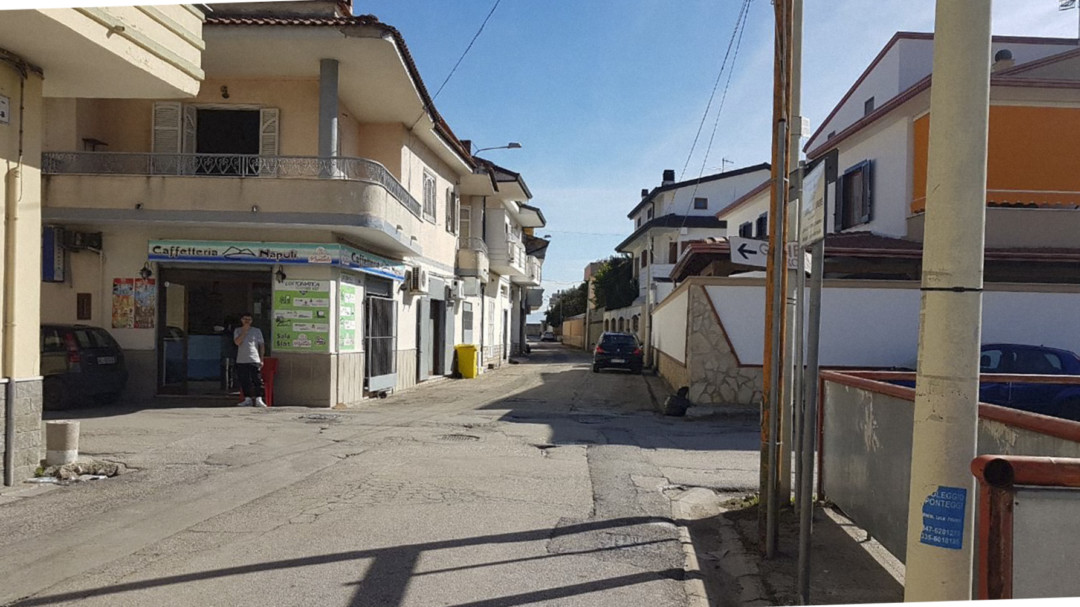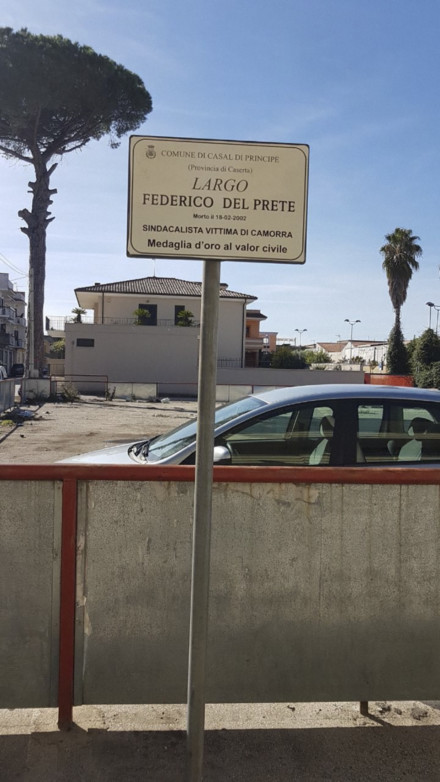18 February 2002
Casal di Principe, Italy
Federico Del Prete
Profession
Community
Motive
Exposure of illegal activity


Adolfo Olivas


Ahmed Divela


Amit Jethwa


Artan Cuku


Babita Deokaran


Bayo Ohu


Berta Cáceres


Bhupendra Veera


Bill Kayong


Boris Nemtsov


Boško Buha


Chai Boonthonglek


Charl Kinnear


Chut Wutty


Chynybek Aliev


Cihan Hayirsevener


Daphne Caruana Galizia


Darío Fernández


Derk Wiersum


Deyda Hydara


Édgar Quintero


Edmore Ndou


Edwin Dagua


Federico Del Prete


Fernando Villavicencio


Gezahegn Gebremeskel


Gilles Cistac


Habibur Mondal


Igor Alexandrov


Jacob Juma


Ján Kuciak


Javier Valdez


Joannah Stutchbury


José Ángel Flores


Jules Koum Koum


Kem Ley


Luis Marroquín


Mahamudo Amurane


Marcelo Rivera


María Elena Ferral Hernández


Marielle Franco


Milan Pantić


Milan Vukelić


Muhammad Khan


Nelson García


Nihal Perera


Oliver Ivanović


Orel Sambrano


Perween Rahman


Peter R. de Vries


Rajendra Singh


Salim Kancil


Sandeep Sharma


Sikhosiphi Radebe


Slaviša Krunić


Soe Moe Tun


Victor Mabunda


Virgil Săhleanu


Wayne Lotter


Yuniol Ramírez


Zezico Guajajara
18 February 2002
Casal di Principe, Italy
Profession
Community
Motive
Exposure of illegal activity
If you are killed in southern Italy, there is always a suspicion that it might be your fault.
On the evening of 18 February 2002, Federico Del Prete was shot to death in a sidestreet in Casal di Principe, a town in the municipality of Caserta, at the age of 45. He left behind seven children. With five bullets, a clan of the notorious Camorra mafia, the Casalesi, ended a street vendor’s life.
Del Prete had been due to testify in court the following day against Mattia Sorrentino, a police officer who was a member of another organized-crime group, La Torre, based out of nearby Mondragone. The policeman had been extorting money from the town’s street vendors; in return for this ‘protection’ tax, he would allow them to sell their merchandise in the street markets. Years earlier, Sorrentino had coordinated the theft of six guns from the Mondragone police headquarters, where he worked. His role was just one of the many factors that led to Del Prete’s death.
The Camorra wield great control over southern Italy’s Campania region. Regardless of their scale, all businesses – from street vendors to large corporations – must pay the organization. As money flows to the mafia group, victims are too scared to speak out about the extortion they are subjected to. Between 1970 and 1990, more than 3 500 people were killed in Campania during the Camorra wars; other than the mobsters themselves, 400 of these were innocent victims, including police officers, judges and witnesses to mafia-related crime. Since 2000, the number of innocent victims in Italy has soared again in more recent waves of violence. However, Caserta’s struggles with the Camorra and its entrenchment in daily life are often overshadowed by the syndicate’s more notorious presence in Campania’s capital, Naples.
Del Prete was a simple man with little formal education. Following in his family’s footsteps, Del Prete had always traded in the streets. It is a demanding job, requiring workers to move from town to town each day. Having grown up in a home with 12 brothers, Del Prete also had an innate instinct to defend the poorest and weakest members of society.
The Camorra is not the only threat facing street vendors, who typically lack the resources and knowledge to defend their rights: none of the region’s municipalities provide basic services to enable these traders to work with dignity, such as toilets, water and electricity. Thus, Del Prete was confronted with two types of adversity – and no form of recourse for either.
Del Prete wanted to establish a trade union for street vendors, a move that would completely change the relationship between the Camorra and local businesses. A few months after its inception in 2000, the National Autonomous Union of Street Vendors grew to almost 5 000 members, all of whom alleged they had been denied certain basic rights and were victims of administrative wrongdoing.
As Del Prete gained their trust, members started to talk among themselves about the Camorra’s widespread racketeering that was affecting every town in the area as the syndicate extorted its victims. The Camorra violently coerced vendors with guns, demanding money. Although these acts occurred in the street, in plain view, nobody ever intervened or spoke out, because the Camorra had full control over every social facet of the town.
Del Prete started documenting complaints about mafia activity and sent them to the local police, the Carabinieri, lawyers and municipalities. His name became ubiquitous as papers signed with his name appeared everywhere, putting himself at significant risk from the Camorra. At the time of his death, Del Prete had personally signed 86 complaints about criminal activity in the land of omertà (code of silence about criminal activity). As one detective said:
The first time I saw a complaint by Federico, I couldn’t believe my eyes. Not only did it report in detail how the Camorra was asking for money, but there was also a signature. I mean, at the time no one was talking; fear was the omnipresent emotion! When I received the fax, I really didn’t know what was going on, but later on, I realized that I’d met a true fearless hero.
Because of Del Prete’s brave initiative, detective Massimiliano Ercolano apprehended Sorrentino, who was a member of the La Torre clan. This was unprecedented.

Scene of the killing

In a square in Casal di Principe, a public sign honours Del Prete
Raffaele Cantone, the judge who presided over the trial against Del Prete’s killers, recalled how he had uncovered another dramatic development: the ‘plastic bag racket’. Cantone told the author:
[The] Camorra imposed itself on every street vendor. […] They were forced to buy plastic bags for five euros per kilo, instead of their standard price, which is around 1.23 euros per kilo. […] They were making millions of euros per year at the expense of those small and poor market businesses that battle on. […] And Federico wrote about every single problem and sent it to us.
On the day of Del Prete’s funeral, only his family attended; none of the union members showed up. His death was met with silence and isolation as rumours of how perhaps he had done something wrong and how perhaps he was ‘one of them’ started circulating. At first, his legacy was erased.
Despite the initial silence surrounding his death, Del Prete’s family, along with support from news reporters, revived his memory as time passed. Del Prete’s older brother, Vincenzo, spoke of how he had tried to protect his bravely determined brother, saying that he had tried to persuade him to emigrate to Venezuela. ‘I could raise some money and [help him] start all over, but he didn’t want any help’. Del Prete said that he couldn’t give up his good work or betray the people who trusted him.
Today, Del Prete’s example lives on: one of his sons produces ecologically-friendly plastic bags named in his honour. A property formerly occupied by the Camorra, and later confiscated by the state, was turned into a public space with an open-air market commemorating this working-class hero. Furthermore, street vendors began to acquire their rights, and fear and silence were replaced with platforms for constructive complaints and cooperation with law enforcement.
Del Prete’s killer, Antonio Corvino, was ultimately convicted (he is now a pentito – an ex-mafia member who turns state witness), along with Sorrentino. Corvino also named accomplices, senior members of the Casalesi group, but they could not be convicted.
Del Prete’s story is today widely told to those who visit Casal di Principe. What was once a Camorra town, which headquartered and housed one of Campania’s most brutal clans, is now a free place that hosts a museum dedicated to the Camorra’s innocent victims. Houses and buildings that once belonged to the Camorra are now used by the community; the town’s mayor recently inaugurated a school on property confiscated from the syndicate. Because of Del Prete’s activism and the sacrifices he made to defend his rights and working conditions of his fellow street vendors, economic life is once again emerging in this former mafia stronghold.


8 April 2017
Tirana, Albania
Artan Cuku


27 February 2015
Moscow, Russia
Boris Nemtsov


10 June 2002
Belgrade, Serbia
Boško Buha


19 December 2009
Bandirma, Turkey
Cihan Hayirsevener


16 October 2017
Bidnija, Malta
Daphne Caruana Galizia


18 September 2019
Amsterdam, Netherlands
Derk Wiersum


1 July 2001
Slavyansk, Ukraine
Igor Alexandrov


21 February 2018
Veľká Mača, Slovakia
Ján Kuciak


11 June 2001
Jagodina, Serbia
Milan Pantić


6 November 2007
Banja Luka, Bosnia and Herzegovina
Milan Vukelić


16 January 2018
North Mitrovica, Kosovo
Oliver Ivanović


15 July 2021
Amsterdam, The Netherlands
Peter R. de Vries


22 April 2019
Banja Luka, Bosnia and Herzegovina
Slaviša Krunić


7 September 2000
Iași, Romania
Virgil Săhleanu